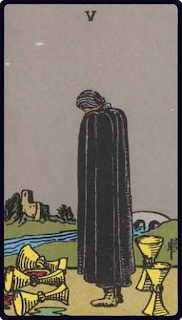
Representing conflict; the 5 of Cups is associated with the possible result of our reflection, where our relationships have broken down, perhaps beyond repair. In the future position within Tarot spreads this can be a sign of conflict to come in our relationships, it does not necessarily mean that conflict will end in breakdown but rather that the illusion of harmony is to be shattered and the conflict laid bare, this will transform the relationship reshaping it into something new that we must then consider; relationships can be strengthened or they can fall apart in this period of tumult.
In the upright state the 5 of Cups represents difference of opinions, conflicting priorities, differing beliefs, and an inability to resolve disputes using old logic and reason. The 5 of Cups portends change and disruption, it is up to us how we navigate that period of turmoil.
In the inverted state the 5 of Cups once again represents stagnation, what might not cause conflict outright may otherwise cause movement and progress in the relationship to grind to a halt. This can be interpreted as different visions for the future with no way to resolve those into one common shared vision, influences that pull in opposing directions resulting in a complete lack of movement.
In the Rider-Waite deck, a lone figure shrouded in a black robe stands looking down at 3 cups which have been spilled with 2 more which stand resolute in his wake. This depiction represents the destructive element of conflict, the connection formed by the 3 of Cups has literally been lost, and the surviving potential to reconstruct and rebuild mirrors the 2 of Cups. The 5 of Cups ultimately portends to a crossroads where a decision will have to be made, reflecting on the 4 of Cups which emphasised preparation, the 5 of Cups represents ultimatum, what we may not have acted upon as a result of our contemplation we may now be forced to do so.
In self-reflection the 5 of Cups serves as a prompt to consider the negative elements that you may have failed to remove and revaluate your methods to mitigate those negative influences. As with creativity, once again, positive influences here do not need to be addressed - problems need to be solved, solutions do not.
This conflict can either be internal or external in nature; where the conflict arises from an internal struggle it is often the case that our shyness, social anxiety, and apprehension are the root of our inability to connect, or our inability to resolve differences between our viewpoint and that of the focus of our connection. When engaging with others, most people are not great at small talk; those that appear well versed are often relying on a greater attention to detail, and retaining past experiences, with a focus on common ground and shared interests. This can be recognised in others by patterns of conversation, always starting conversations from a specific topic or past event for instance.
You can create the potential for conversation by being more open and expressive about the things you like and find interesting. Overcoming your shyness or the reluctance to share motivated by past negative experiences can be difficult but the emphasis here should be on recognising that past experiences are not always reliable as templates to frame our expectations of future interactions. You are not the same person that you were 10 years ago, and neither are the people you attempt to interact with; relying on experiences from that time to shape expectations of the reactions of others is counterproductive.
Ask yourself “What is holding me back?” and “How can I make myself more approachable?” consider if particular past experiences are determining the answers to these questions. When this relates specifically to resolving conflict between our emotions and our feelings, the question instead turns to whether or not you are recognising your own negative emotions and whether or not you are expressing those. Ask yourself “Have I showed them how I am feeling?” strong relationships are built on effective communication, being able to express your feelings both positive and negative is important to be able to resolve conflict. You can’t expect others to be able to read your mind or to read your emotions with accuracy, you need to assume that others know primarily what you choose to tell them, and let their actions shape your understanding of their awareness beyond what you communicate. Everyone has different past experiences and others may be surprised by the experiences that you have had; if you choose not to share these experiences then do not create expectations of others to react as if they were already aware of them.

No comments:
Post a Comment
All comments are moderated before they are published. If you want your comment to remain private please state that clearly.